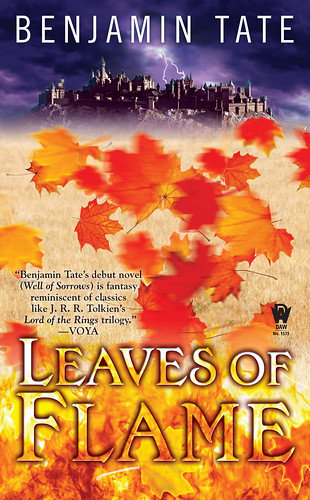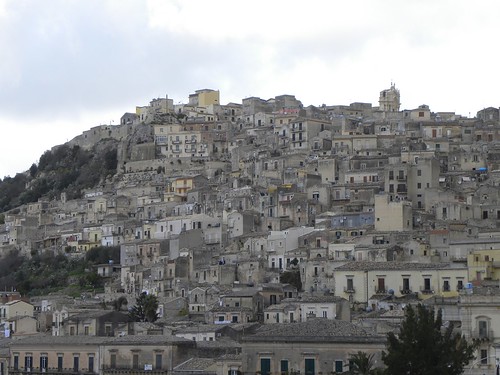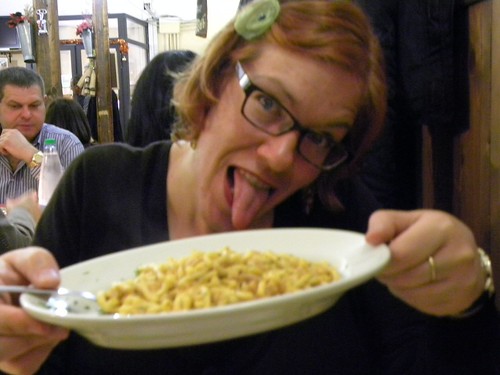Some of you may have heard of Joshua Palmatier; he’s one of those writers who openly publishes under a pseudonym. Joshua has given interviews about his evolution into Ben Tate, about the hows and whys of this double life. But did you know he has another not-so-secret identity? He’s also an editor.
Palmatier’s most recent anthology is The Modern Fae’s Guide to Surviving Humanity , which he co-edited with Patricia Bray. It includes stories by Jay Lake, Elizabeth Bear, Jim Hines, and a whole array of the hottest writers working in urban fantasy today. Meanwhile, his January novel, LEAVES OF FLAME, is the sequel to the well-received Benjamin Tate novel WELL OF SORROWS.
, which he co-edited with Patricia Bray. It includes stories by Jay Lake, Elizabeth Bear, Jim Hines, and a whole array of the hottest writers working in urban fantasy today. Meanwhile, his January novel, LEAVES OF FLAME, is the sequel to the well-received Benjamin Tate novel WELL OF SORROWS.
I asked him…
How did your dual career evolve–are you a writer who became an editor, an editor who became a writer, or some other manner of creature?
Oh, I’m definitely a writer who became an editor. In fact, I’m still kind of shocked that the editing thing happened. It wasn’t something that really crossed my mind as part of the publishing industry I could/should pursue. Basically, I was at a multi-author signing and afterwards we all got together for drinks (as authors are wont to do), and during the animated conversation someone brought up writing short stories centered around a bar. This evolved into the idea that the bars in the story were actually the same bar and it was simply shifting through time. And then Patricia suggested that the bartender be Gilgamesh, and lo! the After Hours: Tales from Ur-Bar anthology was born. Of course, we still had to sell the idea and that’s where all of these grand ideas that occur to writers at bars usually die. But I decided the idea was worth pursuing and so I asked someone at Tekno how we could get our idea pitched to DAW, since that’s what Tekno does. They asked me to pitch it to them right then, which I did, and they liked it enough they asked for a written proposal by the next day because they were doing a batch of pitches to DAW then. I scrambled to get the proposal written and (months later, of course) we heard that DAW had bought the anthology. This is when me and Patricia panicked, because neither one of us had ever edited anything before, but we did what authors always do in such circumstances: cracked open a bottle of wine, opened a box of chocolate, and got to work. We enjoyed the experience so much that we pitched some ideas for additional anthologies and sold The Modern Fae’s Guide to Surviving Humanity
anthology was born. Of course, we still had to sell the idea and that’s where all of these grand ideas that occur to writers at bars usually die. But I decided the idea was worth pursuing and so I asked someone at Tekno how we could get our idea pitched to DAW, since that’s what Tekno does. They asked me to pitch it to them right then, which I did, and they liked it enough they asked for a written proposal by the next day because they were doing a batch of pitches to DAW then. I scrambled to get the proposal written and (months later, of course) we heard that DAW had bought the anthology. This is when me and Patricia panicked, because neither one of us had ever edited anything before, but we did what authors always do in such circumstances: cracked open a bottle of wine, opened a box of chocolate, and got to work. We enjoyed the experience so much that we pitched some ideas for additional anthologies and sold The Modern Fae’s Guide to Surviving Humanity , our latest anthology, coming out March 6th, 2012.
, our latest anthology, coming out March 6th, 2012.
Tell us a bit about this latest anthology: how did it come together?
Ha, well, The Modern Fae’s Guide to Surviving Humanity didn’t come about in a bar. Once we’d had such fun putting together AFTER HOURS, we decided we wanted to do another anthology. I had this idea for a short story that involved the fae, but in a modern setting, and I thought having an entire set of such stories would be cool. I told Patricia about the story and we put together a proposal based on that. However, during the course of writing the proposal, the concept slipped into something slightly different and so my story no longer fit the anthology. (Basically, the anthology is much more urban fantasy in nature, and my story wasn’t.) But that was fine; it was only driving the idea and I’d only planned on using it in the anthology if we needed it to fill up some space. In any case, we pitched the idea along with a few others and that was the one DAW was interested in. Once sold, we asked multiple authors to submit stories (a much wider pool than for the AFTER HOURS anthology since we felt more comfortable being editors), and of course got a slew of great tales. We actually had so many we had to pick and choose which ones to include. This was the first time we had to deal with rejections, which was hard, but it’s all part of the business.
didn’t come about in a bar. Once we’d had such fun putting together AFTER HOURS, we decided we wanted to do another anthology. I had this idea for a short story that involved the fae, but in a modern setting, and I thought having an entire set of such stories would be cool. I told Patricia about the story and we put together a proposal based on that. However, during the course of writing the proposal, the concept slipped into something slightly different and so my story no longer fit the anthology. (Basically, the anthology is much more urban fantasy in nature, and my story wasn’t.) But that was fine; it was only driving the idea and I’d only planned on using it in the anthology if we needed it to fill up some space. In any case, we pitched the idea along with a few others and that was the one DAW was interested in. Once sold, we asked multiple authors to submit stories (a much wider pool than for the AFTER HOURS anthology since we felt more comfortable being editors), and of course got a slew of great tales. We actually had so many we had to pick and choose which ones to include. This was the first time we had to deal with rejections, which was hard, but it’s all part of the business.
Do you find that fiction writing and editing are easy roles to keep in balance? One assumes there’s a time crunch–because many of us live in a perpetually time-crunched state–but are there any challenges involved wearing both hats? What about benefits?
Actually, I was surprised how easy it was to switch from one role to the other. I was only dealing with one anthology per year, so it wasn’t as intense as what our editors at Tor and DAW deal with on a daily basis. Most of the heavy work involved came when the stories were handed in and we had to read them for either inclusion in the anthology, or for potential edits. After that, we had to reread them all for the copy edits and page proof phase of the publishing process. But overall, it was something I could easily balance with my continued writing. Mostly, I worked on the writing in the afternoons (and mornings when I wasn’t teaching), and did my editing in the evenings after the gym. Patricia and I would get together after having read the stories individually to discuss our thoughts on what to include, what needed additional revisions, etc. I think it helps tremendously that both Patricia and I are incredibly organized, so nothing got lost or misplaced, and we were always on schedule, if not ahead of schedule during the entire process. The most challenging aspect was choosing the order in which the stories would be placed in the anthology. For AFTER HOURS, that was easy (chronological order); but for MODERN FAE, we wanted to make certain there weren’t two similar stories (two humorous or two dark) back-to-back. We wanted to stress the variety of the stories by having it switch back and forth. But even then you want the stories to slow well into one another so the transitions aren’t jarring. As for benefits, I really think it gave both Patricia and I an appreciation for what our own editors have to deal with one a much larger scale every day. I also think being a writer made it easier for us to talk to the other authors and discuss their stories, what we thought would make them better, etc.
Your latest Ben Tate novel, Leaves of Flame , opens with your wizard character Colin having mastered three of five possible magical disciplines. Can you tell us a little about how you structured this magic system–why the divisions exist, and what the pitfalls might be?
, opens with your wizard character Colin having mastered three of five possible magical disciplines. Can you tell us a little about how you structured this magic system–why the divisions exist, and what the pitfalls might be?

Ah, the magic system. I like things that aren’t quite so set in stone, so my system isn’t based on something like “throw two pinches of orcbane into ground swallow’s bone, mix with fairy blood, then drink.” It’s much more . . . metaphysical, I guess. I have five essential magics, although they all interact and blend with each other at the edges. I think of the five as sort of a continuum, like the spectrum of light, and each person falls into that continuum in some place. Where they fall determines what kind of magic they have an affinity for and how strong they will be when using that magic. It’s more complicated than this, actually, because people can have an affinity for more than one magic (as Colin does), but that’s the basic idea. Someone really strong with the magic I call the Rose will be centered strongly on the part of the continuum. If Rose corresponds to red in the light spectrum, then someone strong in the Rose will be a deep, dark red in color. Then, of course, there are some people that have no affinity for any of the five magics. And the magic itself is also ethereal in nature. For example, in the Ben Tate books, I play around with the magic I call the Lifeblood—the water in the Well of Sorrows that (as far as Colin can tell) makes someone immortal and allows them to manipulate time. There are obvious limits to this power, which Colin discovers through experimentation, so there are obviously “rules,” but it isn’t as solid or obvious what those rules are as it might be in some fantasy novels. I like this sense of an unseen structure, but with enough freedom for the characters to explore and for the magic to expand. The obvious pitfall is that as the series continues (and the world expands), you have to be careful that you keep all of the so-called “established” rules from previous novels in mind in the later ones, so that you don’t accidentally violate some principle that you established earlier on. I hate when this happens in novels I read (where a rule becomes “inconvenient” for the current plot and so the author “changes” the rules so that things will work like they want), and so I’m extremely conscious of it in my own work. However, the more books I write, the harder it is to keep track of everything! Copious notes are necessary.
Do you ever think about a dream project… the book you’d write or edit if you had carte blanche and a magically guaranteed audience? What would that look like?
Hmm . . . well, I’d have to say that I’ve been lucky in that DAW has supported my writing dreams to the extent that they’ve been interested in pretty much everything I’ve wanted to write up to this point. So in essence, the books I’m currently writing are all ones that I really want to write. What I’m missing in all of this is the magically guaranteed audience. I could always use more fans! *grin* But seriously, I think the only thing I dream about right now is the continued chance to write the books that are flitting around in my head. There are probably 15 ideas for other books demanding attention at the moment, so I have plenty of projects to look forward to in the future . . . if I can find someone willing to buy them. I’d also like to continue editing anthologies. Patricia and I have a few proposals ready to be pitched when the opportunity arises. I’d like to get the chance to wrangle authors again in the near future.
Joshua Palmatier (www.joshuapalmatier.com), otherwise known as Benjamin Tate (www.benjamintate.com) is a fantasy writer with DAW Books, with two series on the shelf, a few short stories. As mentioned, he is co-editor with Patricia Bray of two anthologies. Check out the “Throne of Amenkor” trilogy—The Skewed Throne, The Cracked Throne, and The Vacant Throne—under the Joshua Palmatier name. And look for the “Well” series—Well of Sorrows and the just released Leaves of Flame—by Benjamin Tate. His short stories are included in the anthologies Close Encounters of the Urban Kind (edited by Jennifer Brozek), Beauty Has Her Way (Jennifer Brozek), and River (Alma Alexander). And the two anthologies he’s co-edited are After Hours: Tales from the Ur-bar and the upcoming The Modern Fae’s Guide to Surviving Humanity (March 2012). Find out more about both names at www.joshuapalmatier.com and ww.benjamintate.com, as well as on Facebook, LiveJournal, and Twitter.






